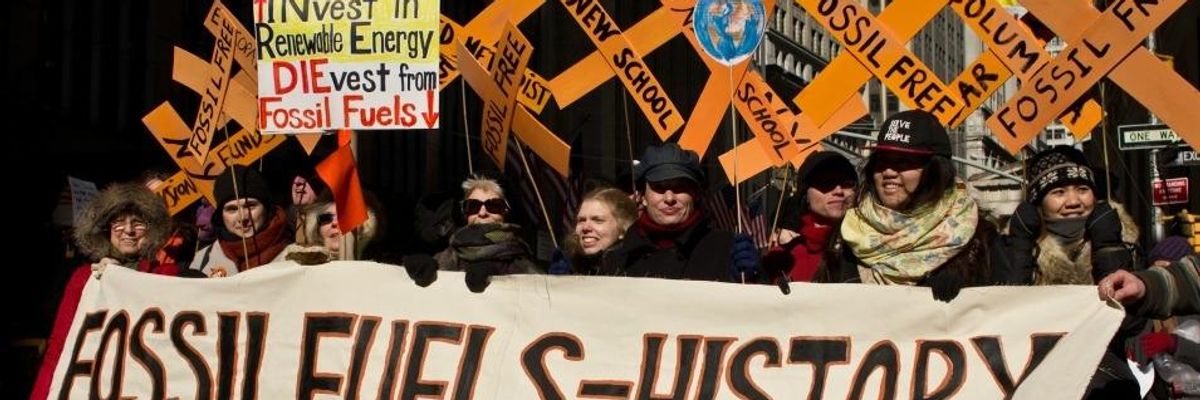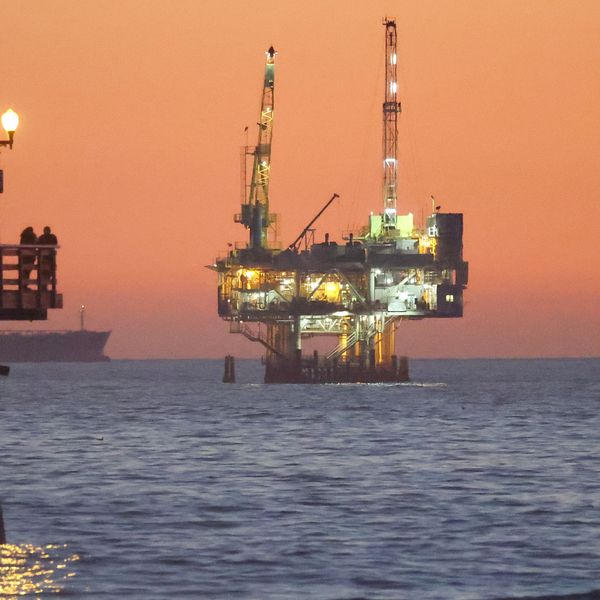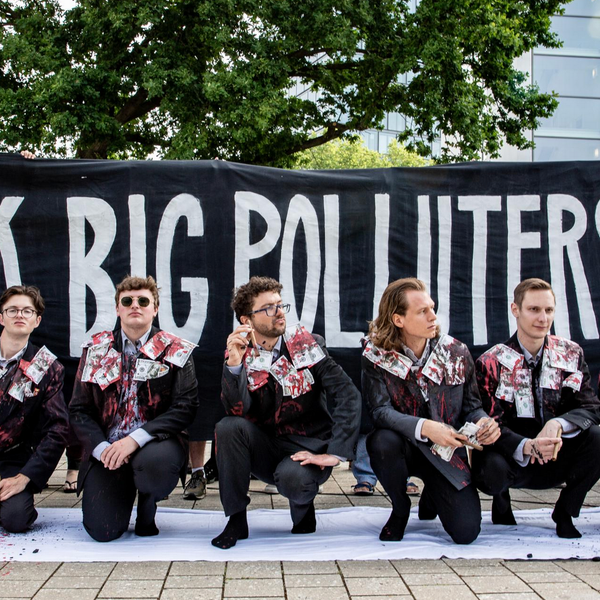
Fossil fuel divestment and climate liability lawsuits amount to a one-two punch aimed at the deep pockets of fossil fuel corporations. (Photo: 350.org/flickr/cc)
Time to Hold Petroleum Perpetrators Accountable for Climate Damage
The attempt to hold the fossil fuel industry accountable through litigation is gaining momentum.
"We'll see you in court."
That's the message New York City recently sent to the industry recklessly destabilizing Earth's climate. In announcing a new lawsuit against five of the largest corporate oil companies, Mayor Bill de Blasio said, "It's time for Big Oil to take responsibility for the devastation they have wrought." Mayor de Blasio cited Hurricane Sandy as a painful and costly example of the consequences of decades of climate denial on the part of fossil fuel companies that put their short-term profits above the health and safety of people and the planet.
"What a horrible and disgusting way to profit, a way that has put so many people's lives in danger," said de Blasio. "It's time they are held accountable."
The attempt to hold the fossil fuel industry accountable through litigation is gaining momentum. A handful of cities and counties in California have filed lawsuits of their own against Exxon and company, alleging defendants have known for nearly 50 years about the role of their product in driving climate change and deliberately concealed the danger. The plaintiffs want these companies to pay for the costs of climate impacts like flooding and sea level rise - impacts that could have been mitigated had the fossil fuel industry not blocked the transition to a low-carbon economy.
As these impacts become more grave and widespread (not to mention expensive), we can expect more communities to take action to address the problem, including legal action against petroleum perpetrators most responsible for causing the damage.
There is now strong evidence that ties a significant amount of fossil fuel emissions to the corporations that produce that fuel. A 2013 study by Richard Heede found that nearly two-thirds of greenhouse gas pollution since the Industrial Revolution came from the production operations of just 90 companies. Building on that research, a study released last September determined that these 90 entities are responsible for nearly half of global temperature rise and about a third of sea level rise since 1880, and roughly 26-32% of temperature rise and 11-14% of sea level rise since 1980 - the time when the industry was largely aware of the link between fossil fuels and climate change.
The development of this attribution science is important for the climate liability lawsuits like the one NYC is taking on. In the past the courts have been wary of linking a specific climate-related injury to any particular defendant, but now the causal chain is much stronger. The fact that the so-called "Carbon Majors" are (as the name implies) major contributors to carbon pollution may be enough to trigger liability.
For Millennials like myself, these climate lawsuits are my generation's tobacco litigation. Since Big Oil copied the playbook of Big Tobacco in peddling a product it knew was harmful and lying about the risks, it should not be surprised to find itself facing litigation and potential liability. Of course the downside of litigation is that it takes time, sometimes decades. We don't have that kind of time to fix the mess the fossil fuel companies got us into.
That's why we have other tools in the toolbox. Divestment is one of them. About $6 trillion has been taken out of fossil fuels over the past five years. A movement that started on college campuses has spread to some of the largest institutions in the world, including the world's largest sovereign wealth fund in Norway. America's largest city is divesting too. When Mayor de Blasio announced his climate lawsuit in January, he also announced the City would begin the process of dumping $5 billion of pension fund dollars from holdings in the fossil fuel industry. The City wants to redirect that money into low-carbon investments and in companies that take climate risk seriously.
Taken together, fossil fuel divestment and climate liability lawsuits amount to a one-two punch aimed at the deep pockets of fossil fuel corporations. It's already getting their attention and prompting them to fight back, and we can expect them to fight tooth and nail. But unless they show that they are ready to drastically change their business model to align with a zero-carbon future, it's up to all of us to keep up the pressure and, in the words of Mayor de Blasio, "fight like our lives depend on it. Because they do."
An Urgent Message From Our Co-Founder
Dear Common Dreams reader, The U.S. is on a fast track to authoritarianism like nothing I've ever seen. Meanwhile, corporate news outlets are utterly capitulating to Trump, twisting their coverage to avoid drawing his ire while lining up to stuff cash in his pockets. That's why I believe that Common Dreams is doing the best and most consequential reporting that we've ever done. Our small but mighty team is a progressive reporting powerhouse, covering the news every day that the corporate media never will. Our mission has always been simple: To inform. To inspire. And to ignite change for the common good. Now here's the key piece that I want all our readers to understand: None of this would be possible without your financial support. That's not just some fundraising cliche. It's the absolute and literal truth. We don't accept corporate advertising and never will. We don't have a paywall because we don't think people should be blocked from critical news based on their ability to pay. Everything we do is funded by the donations of readers like you. Will you donate now to help power the nonprofit, independent reporting of Common Dreams? Thank you for being a vital member of our community. Together, we can keep independent journalism alive when it’s needed most. - Craig Brown, Co-founder |
"We'll see you in court."
That's the message New York City recently sent to the industry recklessly destabilizing Earth's climate. In announcing a new lawsuit against five of the largest corporate oil companies, Mayor Bill de Blasio said, "It's time for Big Oil to take responsibility for the devastation they have wrought." Mayor de Blasio cited Hurricane Sandy as a painful and costly example of the consequences of decades of climate denial on the part of fossil fuel companies that put their short-term profits above the health and safety of people and the planet.
"What a horrible and disgusting way to profit, a way that has put so many people's lives in danger," said de Blasio. "It's time they are held accountable."
The attempt to hold the fossil fuel industry accountable through litigation is gaining momentum. A handful of cities and counties in California have filed lawsuits of their own against Exxon and company, alleging defendants have known for nearly 50 years about the role of their product in driving climate change and deliberately concealed the danger. The plaintiffs want these companies to pay for the costs of climate impacts like flooding and sea level rise - impacts that could have been mitigated had the fossil fuel industry not blocked the transition to a low-carbon economy.
As these impacts become more grave and widespread (not to mention expensive), we can expect more communities to take action to address the problem, including legal action against petroleum perpetrators most responsible for causing the damage.
There is now strong evidence that ties a significant amount of fossil fuel emissions to the corporations that produce that fuel. A 2013 study by Richard Heede found that nearly two-thirds of greenhouse gas pollution since the Industrial Revolution came from the production operations of just 90 companies. Building on that research, a study released last September determined that these 90 entities are responsible for nearly half of global temperature rise and about a third of sea level rise since 1880, and roughly 26-32% of temperature rise and 11-14% of sea level rise since 1980 - the time when the industry was largely aware of the link between fossil fuels and climate change.
The development of this attribution science is important for the climate liability lawsuits like the one NYC is taking on. In the past the courts have been wary of linking a specific climate-related injury to any particular defendant, but now the causal chain is much stronger. The fact that the so-called "Carbon Majors" are (as the name implies) major contributors to carbon pollution may be enough to trigger liability.
For Millennials like myself, these climate lawsuits are my generation's tobacco litigation. Since Big Oil copied the playbook of Big Tobacco in peddling a product it knew was harmful and lying about the risks, it should not be surprised to find itself facing litigation and potential liability. Of course the downside of litigation is that it takes time, sometimes decades. We don't have that kind of time to fix the mess the fossil fuel companies got us into.
That's why we have other tools in the toolbox. Divestment is one of them. About $6 trillion has been taken out of fossil fuels over the past five years. A movement that started on college campuses has spread to some of the largest institutions in the world, including the world's largest sovereign wealth fund in Norway. America's largest city is divesting too. When Mayor de Blasio announced his climate lawsuit in January, he also announced the City would begin the process of dumping $5 billion of pension fund dollars from holdings in the fossil fuel industry. The City wants to redirect that money into low-carbon investments and in companies that take climate risk seriously.
Taken together, fossil fuel divestment and climate liability lawsuits amount to a one-two punch aimed at the deep pockets of fossil fuel corporations. It's already getting their attention and prompting them to fight back, and we can expect them to fight tooth and nail. But unless they show that they are ready to drastically change their business model to align with a zero-carbon future, it's up to all of us to keep up the pressure and, in the words of Mayor de Blasio, "fight like our lives depend on it. Because they do."
"We'll see you in court."
That's the message New York City recently sent to the industry recklessly destabilizing Earth's climate. In announcing a new lawsuit against five of the largest corporate oil companies, Mayor Bill de Blasio said, "It's time for Big Oil to take responsibility for the devastation they have wrought." Mayor de Blasio cited Hurricane Sandy as a painful and costly example of the consequences of decades of climate denial on the part of fossil fuel companies that put their short-term profits above the health and safety of people and the planet.
"What a horrible and disgusting way to profit, a way that has put so many people's lives in danger," said de Blasio. "It's time they are held accountable."
The attempt to hold the fossil fuel industry accountable through litigation is gaining momentum. A handful of cities and counties in California have filed lawsuits of their own against Exxon and company, alleging defendants have known for nearly 50 years about the role of their product in driving climate change and deliberately concealed the danger. The plaintiffs want these companies to pay for the costs of climate impacts like flooding and sea level rise - impacts that could have been mitigated had the fossil fuel industry not blocked the transition to a low-carbon economy.
As these impacts become more grave and widespread (not to mention expensive), we can expect more communities to take action to address the problem, including legal action against petroleum perpetrators most responsible for causing the damage.
There is now strong evidence that ties a significant amount of fossil fuel emissions to the corporations that produce that fuel. A 2013 study by Richard Heede found that nearly two-thirds of greenhouse gas pollution since the Industrial Revolution came from the production operations of just 90 companies. Building on that research, a study released last September determined that these 90 entities are responsible for nearly half of global temperature rise and about a third of sea level rise since 1880, and roughly 26-32% of temperature rise and 11-14% of sea level rise since 1980 - the time when the industry was largely aware of the link between fossil fuels and climate change.
The development of this attribution science is important for the climate liability lawsuits like the one NYC is taking on. In the past the courts have been wary of linking a specific climate-related injury to any particular defendant, but now the causal chain is much stronger. The fact that the so-called "Carbon Majors" are (as the name implies) major contributors to carbon pollution may be enough to trigger liability.
For Millennials like myself, these climate lawsuits are my generation's tobacco litigation. Since Big Oil copied the playbook of Big Tobacco in peddling a product it knew was harmful and lying about the risks, it should not be surprised to find itself facing litigation and potential liability. Of course the downside of litigation is that it takes time, sometimes decades. We don't have that kind of time to fix the mess the fossil fuel companies got us into.
That's why we have other tools in the toolbox. Divestment is one of them. About $6 trillion has been taken out of fossil fuels over the past five years. A movement that started on college campuses has spread to some of the largest institutions in the world, including the world's largest sovereign wealth fund in Norway. America's largest city is divesting too. When Mayor de Blasio announced his climate lawsuit in January, he also announced the City would begin the process of dumping $5 billion of pension fund dollars from holdings in the fossil fuel industry. The City wants to redirect that money into low-carbon investments and in companies that take climate risk seriously.
Taken together, fossil fuel divestment and climate liability lawsuits amount to a one-two punch aimed at the deep pockets of fossil fuel corporations. It's already getting their attention and prompting them to fight back, and we can expect them to fight tooth and nail. But unless they show that they are ready to drastically change their business model to align with a zero-carbon future, it's up to all of us to keep up the pressure and, in the words of Mayor de Blasio, "fight like our lives depend on it. Because they do."

